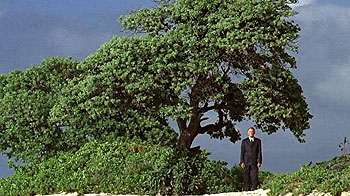In Defense Of Lost
Published on May 30th, 2011 in: Climb Onto The Nearest Star, Issues, Science Fiction, TV |Lost will likely always be a divisive show. And there has been no more divisive element of it than its conclusion. During season six, I was unsure if they would be able to present a satisfying ending. It did not feel like it was reaching the epic potential of the Island‘s history, most notably in “Across the Sea” (Episode 15). I sat down and watched “The End” with a sense of dread. I found myself moved, and then satisfied. On my second viewing, this past month, it left me in tears. For an hour.
Some feel it was a cop-out. The equivalent of the Dallas “IT WAS ALL A DREAM!” shower scene. I feel they avoided that, for a few reasons.

First, and most importantly, the finale did not make the mistake of undermining the stakes within the story. The characters had to die for something. Had it been an afterlife that was unconnected to anything else would have been cheap and stupid. They went to some pains, though, to connect the Island all through seasons one to six with the spirit world, with the dead, with miracles and the unexplainable. The Island was the place in between the normal world and something else.
That “something else” is partially revealed in the final episode, but not fully. As with the exact nature of Jacob’s Cabin, things are left nicely ambiguous. It connected the light of the Island, the abilities of Jacob et al., to shape their own reality, to bring people to the Island, to will things to be, with Lost’s final moments. If Jack had not defeated the Black Smoke, he could not have given them the second go ‘round they deserved, for their sacrifice. So their sacrifice was maintained as a real verifiable thing throughout, much as the time traveling was in seasons four and five.
Secondly, they portrayed the afterlife in such a way to give further information or insight into the characters. Some have suggested that you could cut the entire afterlife scenes and be perfectly fine, from a narrative point of view. This ignores however, that the mystical side of reality was always something Lost explored. This is what the Dharma Initiative wanted to know. Dead people returned to provide closure for characters from very early on in the show’s run. The line between the Island and the afterlife is barely visible. So in what way is it inconsistent with the previous five seasons? Simply, it’s not. Death is the final mystery. It is right that these characters should see it through to the end and share these experiences with the audience.

If you look at how the show dealt with its other mysteries, it had a similar approach. The Others were initially viewed, as the Dharma Initiative members were, from a complete outsider’s perspective. They appeared to be one and the same. Then the scope got a bit wider and it becomes clear that they were not actually the same, that they were, in fact, on opposite sides. Then you have whole episodes set in their world. Eventually these characters become a part of those groups.
The movement towards the afterlife was much the same, except played over a much longer period. Christian Shepherd and his possessed body/form/spirit was in the third episode; the issue of the spirit world and something beyond perceived reality was always a prominent aspect of Lost. It is somewhat similar to people who cried, “Oh, I didn’t think it was a sci-fi show” or “I didn’t think it was fantasy.” When of course, it was always those things. It just had not become apparent yet.
Lost‘s final season showed its characters to be inherently flawed. Their need for redemption went beyond the Island, Jacob, and even their upbringing. Jack took on the burden of the Island and his fellow human beings not to please some disgruntled super-being, but to heal himself. The journey for the ever present doctor, for Sawyer, for Hurley, for Locke, was a personal one. It is right then, that half of the show’s final season was given over to the resolution of that journey. It was not isolated from the Island’s story, either. We learned more about these people. Sayid ultimately felt he did not deserve Nadia. Jack was able to view himself through his father’s eyes, something he was never able to do before.
The Island, and Lost, is about people being given the opportunity, mostly through supernatural means, to heal themselves. Their afterlife was the final part of that story. I defy anyone to watch the moment when Jack breaks down in his father’s arms, and is finally able to let go of the pain in his life, and not see why they ended the show like this. It was not about giving the show a happy ending. It was about allowing the characters to resolve their issues. And for the audience to resolve theirs.
Lost is not something that you should watch with a cynical eye. It is a show for broken people, and those who are no longer broken. And for those who love to be confused. It is the greatest mystery show to have ever been on television. It takes a certain investment on the part of the viewer in order to get the most out of it.
At its best, Lost is the equal of Deadwood or The Sopranos or hell, The Wire. It has a wealth of characters, ideas, and concepts and when it delivers, it delivers big. If you are willing to dive into the bottomless pit, you may find beautiful things there. I found what I was looking for. I hope you do, too.
Time limit is exhausted. Please reload the CAPTCHA.